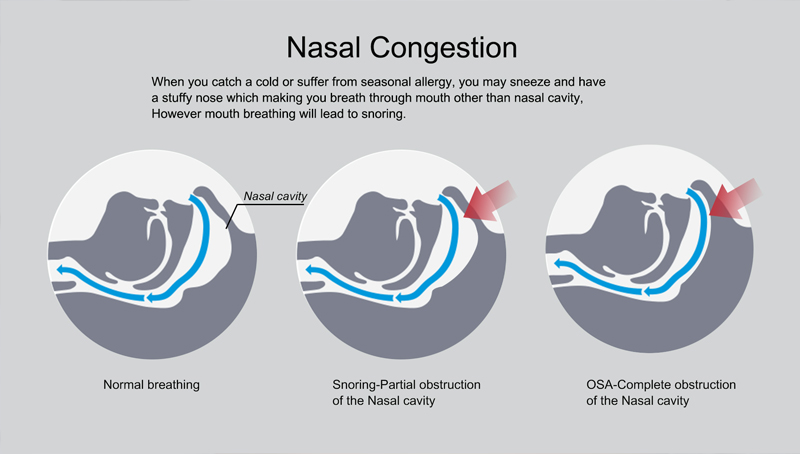

Snoring can be caused by various factors:
Abnormalities of the nasal cavity or pharynx, age, obesity, hormonal factors, alcohol consumption, hay fever,
use of medication with muscle relaxing side effectssmoking etc...
Hay fever
Hay fever is seasonal allergic rhinitis. It is a reaction to pollen of grasses or trees. Hay fever is seasonal because
these pollen are only present in certain seasons. The season in which the pollen are airborne, varies from
species to species.
Smoking
Inhaled cigarette smoke irritates the mucous membrane in the pharynx. This produces a swelling of the
mucous membrane, which causes snoring.
Age
Snoring most frequently occurs in middle age. The possibility of snoring increases up to 60-65 years of age,
after that it decreases.
Obesity
There is a clear connection between the extent of obesity and the occurrence of snoring. Especially the
accumulation of fat around the throat plays an important part.
Pregnancy
Some women start snoring during pregnancy. This as a result of dilated blood vessels and your body retaining
more water. It causes the nasal membranes to swell, which narrows the air way.
Hormonal factors
Snoring can be caused by a deviating hormone regulation: too little thyroid hormone, too much growth hormone.
Women have an increased risk after the menopause because of the reduction of female hormones.
Alcohol consumption
Alcohol consumption during the evening increases the possibility of snoring and apnea's during sleep. This
effect is already seen at 0.07g/dl. Alcohol relaxes the muscles that keep open the pharynx and interferes
with breathing control during sleep.
Use of medication with muscle relaxing side effects
Certain medicines (primarily sleeping medication - benzodiazepines) bring about snoring because they relax
the muscles that ought to keep the pharynx open during sleep.
Common cold
When you suffer from a cold, there is a bigger chance of snoring. A cold or flu cause the membranes in the
nasal cavity and the pharynx to swell. This makes it difficult for inhaled air to flow through the nose, which forces
you to breathe through the mouth.

 USD
USD